Headlines
 The State of Colorado's Economic Development Commission will create two seed grants administered by CUbit that can be used by any Colorado research institution or industry partners. The grants aim to incentivize innovation and develop the quantum workforce of the future.
The State of Colorado's Economic Development Commission will create two seed grants administered by CUbit that can be used by any Colorado research institution or industry partners. The grants aim to incentivize innovation and develop the quantum workforce of the future. Individuals from Sandia National Labs will be on campus Friday, September 15 for a day of engaging with faculty, students and staff working in areas aligned with Sandia priority research areas, including quantum.
Individuals from Sandia National Labs will be on campus Friday, September 15 for a day of engaging with faculty, students and staff working in areas aligned with Sandia priority research areas, including quantum.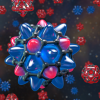 In a recent Science paper, JILA and NIST researchers—in collaboration with the University of Nevada, Reno and Harvard University—observed novel ergodicity-breaking in C60, a highly symmetric molecule composed of 60 carbon atoms, giving further insight into the quantum dynamics of the system.
In a recent Science paper, JILA and NIST researchers—in collaboration with the University of Nevada, Reno and Harvard University—observed novel ergodicity-breaking in C60, a highly symmetric molecule composed of 60 carbon atoms, giving further insight into the quantum dynamics of the system. As part of the Embark Entrepreneurs in Residence cohort, JILA's Eva Yao will lead FLARI in bringing to market a breathalyzer, invented by Jun Ye, capable of detecting molecules in breath or air samples for fast detection of diseases and contaminants.
As part of the Embark Entrepreneurs in Residence cohort, JILA's Eva Yao will lead FLARI in bringing to market a breathalyzer, invented by Jun Ye, capable of detecting molecules in breath or air samples for fast detection of diseases and contaminants.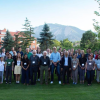 The workshop, organized by Professor Gang Cao (Physics) and supported by NSF, brought together over 100 physicists, materials scientists, chemists, and theorists in the quantum materials community, including 32 invited speakers.
The workshop, organized by Professor Gang Cao (Physics) and supported by NSF, brought together over 100 physicists, materials scientists, chemists, and theorists in the quantum materials community, including 32 invited speakers.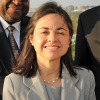 "It is a great honor to receive the Vannevar Bush Fellowship," Rey stated. "It is very exciting since it will help push my research on long-lived multilevel atoms in optical cavities. These are extremely complex systems but with tremendous potential to push the frontier of quantum metrology and simulation."
"It is a great honor to receive the Vannevar Bush Fellowship," Rey stated. "It is very exciting since it will help push my research on long-lived multilevel atoms in optical cavities. These are extremely complex systems but with tremendous potential to push the frontier of quantum metrology and simulation." Research Professor Svenja Knappe, who is a physicist by training but calls the Paul M. Rady Department of Mechanical Engineering home, is an ideal person to be at the center of a growing cluster of quantum researchers who are ushering in the second quantum revolution on campus and abroad.
Research Professor Svenja Knappe, who is a physicist by training but calls the Paul M. Rady Department of Mechanical Engineering home, is an ideal person to be at the center of a growing cluster of quantum researchers who are ushering in the second quantum revolution on campus and abroad.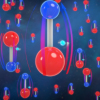 Using a complex setup of lasers and a novel ion trap, Jun Ye and Eric Cornell's teams at JILA and NIST set new records on the precision measurement of the electron electric dipole moment (eEDM). Their results, published in Science as the cover story, improved the measurement by a factor of 2.4.
Using a complex setup of lasers and a novel ion trap, Jun Ye and Eric Cornell's teams at JILA and NIST set new records on the precision measurement of the electron electric dipole moment (eEDM). Their results, published in Science as the cover story, improved the measurement by a factor of 2.4.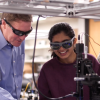 At Q-SEnSE, an NSF Quantum Leap Challenge Institute led by CU Boulder, multidisciplinary teams investigate promising solutions to formidable quantum challenges. In this recently released video, watch Q-SEnSE leaders, faculty and students discuss just a few of their recent projects.
At Q-SEnSE, an NSF Quantum Leap Challenge Institute led by CU Boulder, multidisciplinary teams investigate promising solutions to formidable quantum challenges. In this recently released video, watch Q-SEnSE leaders, faculty and students discuss just a few of their recent projects.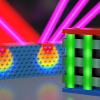 To better understand heat transport at the nanoscale, JILA Fellows Margaret Murnane, Henry Kapteyn and their research groups created the first general analytical theory of nanoscale-confined heat transport, which can be used to engineer heat transport in 3D nanosystems for next-generation energy-efficient devices.
To better understand heat transport at the nanoscale, JILA Fellows Margaret Murnane, Henry Kapteyn and their research groups created the first general analytical theory of nanoscale-confined heat transport, which can be used to engineer heat transport in 3D nanosystems for next-generation energy-efficient devices.

